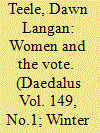|
|
|
Sort Order |
|
|
|
Items / Page
|
|
|
|
|
|
|
| Srl | Item |
| 1 |
ID:
153809


|
|
|
|
|
| Summary/Abstract |
This article explores publication patterns across 10 prominent political science journals, documenting a significant gender gap in publication rates for men and women. We present three broad findings. First, we find no evidence that the low percentage of female authors simply mirrors an overall low share of women in the profession. Instead, we find continued underrepresentation of women in many of the discipline’s top journals. Second, we find that women are not benefiting equally in a broad trend across the discipline toward coauthorship. Most published collaborative research in these journals emerges from all-male teams. Third, it appears that the methodological proclivities of the top journals do not fully reflect the kind of work that female scholars are more likely than men to publish in these journals. The underrepresentation of qualitative work in many journals is associated as well with an underrepresentation of female authors.
|
|
|
|
|
|
|
|
|
|
|
|
|
|
|
|
| 2 |
ID:
177238


|
|
|
|
|
| Summary/Abstract |
Recent research points to a gender gap in journal-article authorship: women are underrepresented. Given that publishing a book remains central to many political scientists’ careers, this article explores the extent to which gender publication and citation gaps also exist for books. We find that although the gender publication gap for university-press books has narrowed over time, it remains larger than for journal articles. We also find that book-authorship patterns do not reflect the shift toward coauthorship observed for journal articles. Conversely, we find no gender citation gap for books written by one woman. However, books coauthored by coed teams or teams of women receive far fewer citations than books written by one man or one woman or by teams of men.
|
|
|
|
|
|
|
|
|
|
|
|
|
|
|
|
| 3 |
ID:
160555


|
|
|
|
|
| Summary/Abstract |
This paper theorizes three forms of bias that might limit women's representation: outright hostility, double standards, and a double bind whereby desired traits present bigger burdens for women than men. We examine these forms of bias using conjoint experiments derived from several original surveys—a population survey of American voters and two rounds of surveys of American public officials. We find no evidence of outright discrimination or of double standards. All else equal, most groups of respondents prefer female candidates, and evaluate men and women with identical profiles similarly. But on closer inspection, all is not equal. Across the board, elites and voters prefer candidates with traditional household profiles such as being married and having children, resulting in a double bind for many women. So long as social expectations about women's familial commitments cut against the demands of a full-time political career, women are likely to remain underrepresented in politics.
|
|
|
|
|
|
|
|
|
|
|
|
|
|
|
|
| 4 |
ID:
171108


|
|
|
|
|
| Summary/Abstract |
There are four contexts in which women have won voting rights: as part of a universal reform for all citizens (15 percent of countries that granted women suffrage); imposed by a conqueror or colonial metropole (28 percent); gradually, after some men had been enfranchised (44 percent); or a hybrid category, often in the wake of re-democratization (14 percent). This essay outlines the global patterns of these reforms and argues that in a plurality of cases, where women's suffrage was gradual, enfranchisement depended on an electoral logic. Politicians subject to competition who believed women would, on average, support their party, supported reform. The suffrage movement provided information, and a potential mobilization apparatus, for politicians to draw on after the vote was extended. Together, both activism and electoral incentives were imperative for reform, providing important lessons for feminist mobilization today.
|
|
|
|
|
|
|
|
|
|
|
|
|
|
|
|
|
|
|
|
|